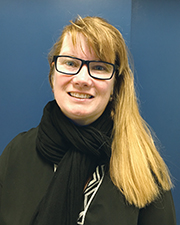04 July 2016
 Twenty-six South Australians will be diagnosed with cancer today and fifty thousand more are living with a recent diagnosis or having active treatment.
Twenty-six South Australians will be diagnosed with cancer today and fifty thousand more are living with a recent diagnosis or having active treatment.
Nurses play an important role caring for people with cancer and their families throughout their cancer journey and UniSA’s School of Nursing and Midwifery, with its innovative curriculum, is educating South Australia’s best nursing graduates with the skills needed to care for people with cancer, now and into the future.
In a move designed to further support UniSA’s nursing and midwifery education and research capabilities Nursing and Midwifery Head of School, Professor Carol Grech, is pleased to welcome Professor Marion Eckert as she begins her role today as the inaugural Professor of Cancer Nursing with the University of South Australia.
“We are very proud of our reputation and achievements in preparing exceptional, qualified professional nurses and midwives to meet the health needs of individuals and communities and Prof Eckert’s extensive expertise and experience will be invaluable across a range of areas,” Prof Grech says.
“With more than 25 years’ experience in the health care industry, Prof Eckert is acknowledged as a prominent nurse leader nationally and internationally in research, consultancy, development of consumer-centred care and evidence-based clinical care practices, policies, academic scholarship and nurse leadership.
“Prof Eckert previously held the position of General Manager, Support, Research and Policy at Cancer Council SA where she was responsible for research initiatives, funding and governance; operational services; client support services; nurse leadership and nurse management.
“As the former Chair of the SA Cancer Services Strategy Committee Prof Eckert managed the research and development of state-wide cancer care plans and strategic initiatives related to cancer prevention, screening and survivorship.”
Prof Eckert’s association with UniSA School of Nursing and Midwifery spans a number of years with industry-linked research and publications and it is her intention to nurture strong research collaborations that inspire partnerships for translational benefit across the state, the nation and the world.
“Demonstrating research relevance to inform and support clinical care and policy is the key to connecting researchers with the broader community so their valuable work can advance health service planning and delivery,” Prof Eckert says.
“Research needs to demonstrate translational benefit to align with health initiatives and services drivers and I am looking forward to being able to lead, foster and support cancer care nursing research across South Australia, the nation and potentially inform international initiatives.
“I will be working hard to ensure research driven by nurses is fostered, and developed through effective partnerships because it is critical that nurses are supported to be entrepreneurial and to drive change through quality research.
“Another focus will be to develop a program of research and stakeholder engagement to establish a population wide cancer survivorship monitoring registry for SA that will track survivor’s quality of life and unmet needs to inform future planning.
“We need to know who is falling through the gaps and gathering quality data will help us to better inform support services, policy and advocacy that will ultimately lead to the development of quality supportive care that can be nurse led across all areas of the state.
“As part of this research the aim will also be to establish a South Australian (and potentially NT) population wide cancer survivorship monitoring tool for childhood cancer survivors, currently there is no coordinated process to develop a linked data system to understand the cancer journey for children.
“Promoting the quality cancer care research that is currently occurring and will progress into the future is vital to engaging clinicians to embed research into their everyday practice.
“With significant programs of health reform underway in this state nurses are well placed to drive strategically relevant research and system wide change that is focused on reducing the burden of cancer on our community.”
Media contact: Katrina McLachlan office +61 883020961 mob 0418823673 email katrina.mclachlan@unisa.edu.au


